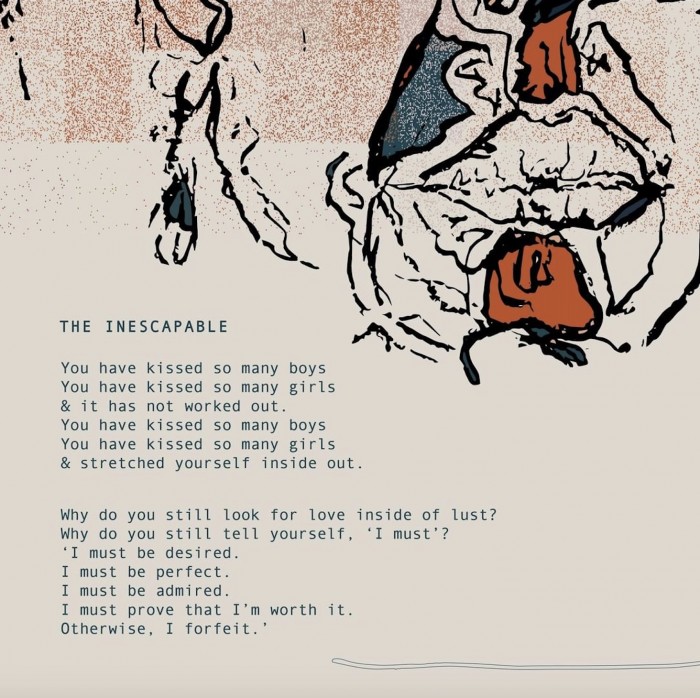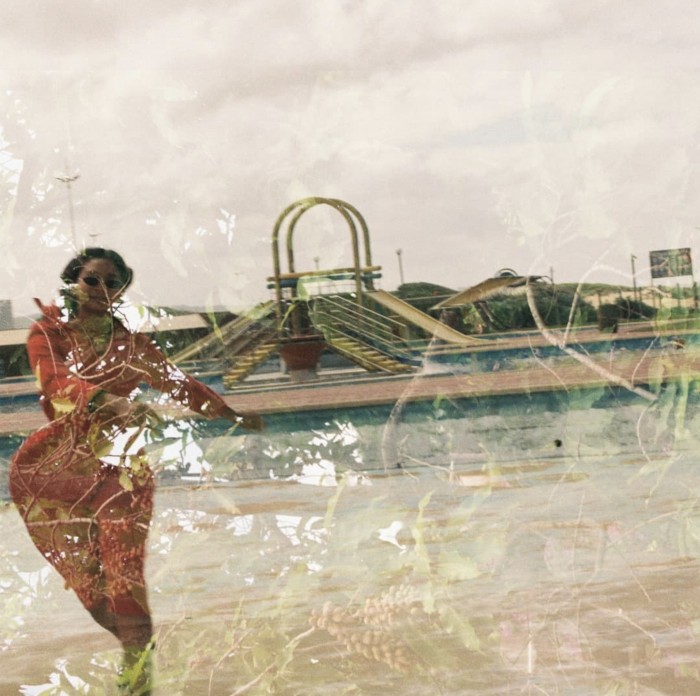Drew Haller is a copywriter, volunteer, researcher, parliamentary reporter and editor-in-chief of Say When Zine.
Haller, who made the move from Durban to Cape Town in early 2022 for a job as a communications officer, gives Design Indaba thoughtful insight into her love of writing, why humanising topics through art is important to her and what we can expect from Say When Zine next.
Check out Haller’s interview below.
1.Tell us about where your love of writing began.
I was 5 years old when I noticed my older sisters using pen and paper for their homework. Curious about this new medium, I desperately wanted to write too. So, jealous and over-eager, I found some stationery and spent a full day practising the alphabet in a messy scribble at the miniature desk in my pink bedroom. The slow ritual of creativity that grew through when I nurtured that tactile relationship between my thoughts, my hands and the page was enthralling. Before then, I had relied on my story books and my voice to act out the prose and parables that always punctuated my thoughts. But once I joined school, and found myself in an English classroom, any creative essay became an opportunity to embellish my reality with new ideas,
new stories. And when it was written down, it was easier to share with others. I found some of those old essays recently, and I was amazed by how potent those stories felt to me.
Writing has always been a very meditative practice for me. As I grew up, I learnt to respect how the medium incites personal reflection, unlocks escape, and allows relief. The process of verbalising and externalising your feelings on a page can be so cathartic, like an acceptance of the fullness of your feelings and the temporality of the human experience. Before you’ve put those words down, you feel heavy – there are things you can’t explain coherently, ideas that circle your brain without resolution, and intuitions that feel distant and doubtworthy. But once you’ve separated the words from yourself, you see them take on new meaning, and suddenly you can look with lucid eyes at your thoughts – however messy or incoherent they might still be – and you can begin to understand the feeling or the moment that captured you at the time.
Writing, as an act, is intrinsically powerful. It represents a willingness to understand, and it is a means of archiving the past in preparation for the present. Every time I journal, compile research, or write a story, I am learning how to communicate. And communication is one of the best ways in which we can connect to each other and ourselves.
2.At Say When Zine you’re approaching topics of colonialism, feminism, climate change and politics using poetry and other forms of creative expression. Why do you feel that it is crucial to use art to tackle such issues?
I think that sometimes we get too caught up in trying to solve things logically and academically, when in fact so many of the massive structural issues we face cannot be rationalised or explained. Sometimes we know the answers and we know what we should do to lessen the impact of the political, but we still act in contradiction of what we know is right and moral because we’re either overwhelmed or jaded. Every day – both offline and online – we’re exposed to massive global crises, and we’re pushed to take responsibility for the state of the world. But with so much pain and suffering, it’s easy to become debilitated and disillusioned.
I think that art helps us to contextualise global issues as real, lived human experiences, instead of statistics or news headlines on a screen. If we can understand how something like racism and sexism affects us and our communities on a personal level, then it becomes easier to understand the significance of these broader issues and empathise with those who are affected. Once we’ve humanised a topic through art, we can begin to approach resolutions and mitigation strategies from a more compassionate, creative and empathetic place. When we take a step back, and we consider how these issues make us feel, how these problems can be mitigated in
our own communities and personal lives, it becomes easier to see the significance of our involvement. When we listen to the song, dance, literature, and spoken word that arises from these social movements, we can reconnect with the cause, and reignite our incentives to understand and, ultimately, act.
3.What are some of your career highlights to date?
Interviewing Floyd Lavine and Chris Soal were two key moments in my career. Before that, I had never really considered myself to be a journalist. Imposter syndrome is a blinding veil, and when I reached out to those artists, I was pessimistic about whether I would get responses. But I was persistent, and now I can look at their write-ups in my portfolio with pride. Hearing their positive responses to my work also gave me a lot of incentive to keep going.
Besides that, being named a Design Indaba Emerging Creative was really a wonderful shock. I actually received the email that I was accepted into the programme while sitting outside of my new office, one day before I started the job that I moved to Cape Town for. It was unbelievable, seeing all of my plans and hopes align like that. So many of the passion projects and side hustles that we work on as artists can go unnoticed, so achieving that level of recognition was proof that the hard work paid off, and that the countless hours spent writing and applying were worth something.
4.Who influences your work and why?
There are so many things, people and places that inspire creativity in me. Whenever I have to write or want to write, I conjure up conversations that I’ve had with friends, family and community members. In truth, they’re the ones who hold me accountable to pursuing my ideas. But then there are also the literary giants, the writers who have shown me how magically an idea can unfold with the careful selection of words. They are:
- Koleka Putuma for her coarse personal and political revelations.
- Patti Smith for her nostalgic, non-linear beats and narratives.
- Phumlani Pikoli for the vibrancy in which he captures South Africa’s cultural cliques and contradictions.
- Yuval Noah Harari for his analytically academic, big-picture insight.
- Sisonke Msimang for her eloquent, globalised, sensory storytelling.
5.How has working in politics influenced your approach to writing and storytelling?
The personal is the political. A lot of people think that politics doesn’t affect them and that they can detach themselves from it, but it really affects everything we do. When you’re complaining about gas prices, you’re commenting on the side-effects of the war in Ukraine, and the state’s fuel levy. When you’re stressed about your safety in the streets of South Africa, you’re experiencing the consequences of corruption, poor oversight instruments, and a lack of political accountability for the Executive and law enforcement.
Our personal lives are a small stage to act out broader socio-political problems. The institutions, policies, regulations, tariffs, and taxes that determine national politics will inevitably influence your life whether you choose to see it or not. And you can ignore it – but for most of us, especially minority groups, it is essential to understand politics if you’re going to learn how to defend yourself against institutional oppressions, and advocate for change.
Politics is simply a lens to understand how we regulate our societies and who gets the power to enforce the social contract. Most of us have been taught to nurture hyper-individualist mindsets, and focus only on our own ambitions, but that can often lead to a detachment from the world around us. Thinking politically, however, can remind you of the interplay between your own life and the lives of those around you. When I write, I try to consider how worlds and ideologies beyond my own will influence our actions, experiences, and thoughts – and only then do I feel as though my work becomes relatable and thought-provoking.
6.What are you working on currently?
At the moment, I’m trying to put together the Ecofuturism volume of Say When Zine. Producing content this year has been particularly challenging because every team member has their own 9 to 5 to attend to and being creative after work hours can be trying. But we’re getting there, slowly but surely, and you can expect to see more work on our Instagram feed and blog very soon. Amongst many other pieces of content, you can expect the usual artist feature, multimedia recommendations, an incredible collaborative playlist, and some journal prompts. Personally, I’m also making headway on two artist features with music producer Nikola Vlok and another piece centered around the works of painter Katlego Tlabela.
Read more:
Artist Olafur Eliasson tackles freedom of press with new artwork.
Credits: Drew Haller








